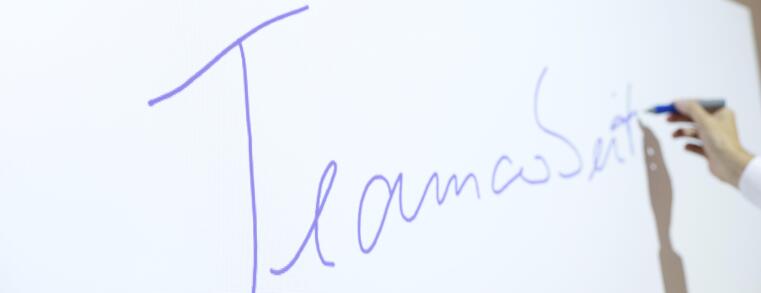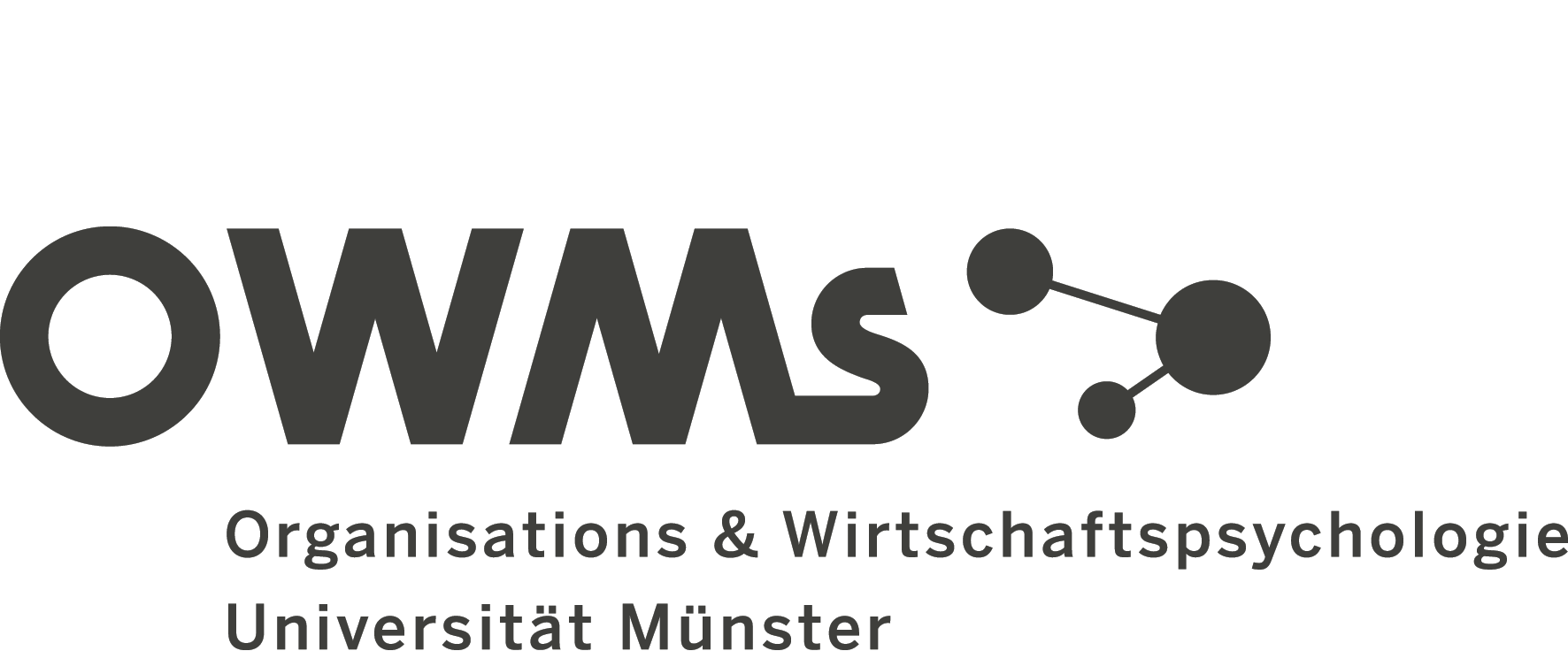
Teamarbeit und Synergien in Gruppen
Der Einsatz von Teamarbeit hat in den letzten Jahren stetig zugenommen, nicht zuletzt weil man sich dadurch zusätzliche Leistungen verspricht die mehr sind als die einfache Summe der Einzelleistungen der Teammitglieder. Solche Prozessgewine oder "Synergie"- Effekte in Teams entstehen jedoch nicht von alleine, sondern benötigen spezifische Voraussetzungen und Rahmenbedingungen. Die psychologische Forschung hat erst vor wenigen Jahren begonnen, sich mit diesen Erfolgsfaktoren systematisch zu beschäftigen.
Ein Schwerpunkt unserer Arbeit liegt auf sog. Motivationsgewinnen durch Teamarbeit, also der Frage, unter welchen Bedingungen Personen durch Gruppenarbeit stärker motiviert sind als wenn sie für sich alleine arbeiten. Diese Frage ist nicht trivial da die Gruppenforschung in vergangenen Jahren deutlich gezeigt hat, dass Teammitglieder ihre Leistung oft überschätzen und als Konsequenz eher Motivationsverluste in Gruppen auftreten.
In mehreren Serien von kontrollierten Laborstudien haben wir zugrundeliegende Prozesse von Motivationsgewinnen in Gruppen wiederholt nachweisen können, und diese auch in ersten Feldstudien repliziert. Ein zentraler Auslöser ist dabei die erlebte Unverzichtbarkeit (social indispensability) bzw. Verantwortlichkeit für Andere. Konzeptionen von Menschen als reine Maximierer des persönlichen Nutzen greifen somit hier zu kurz um das Potenzial von Personen in Arbeitsprozessen abzubilden.
Diese Forschungs wird von der Deutschen Forschungsgemeinschaft seit 2004 in bislang 3 Projektphasen gefördert (HE 2745/8-1,2, HE 2745/8-3, HE 2745/8-4).
Publikationen
Hüffmeier, J., Hertel, G., Torka, A.-K., Nohe, C., & Krumm, S. (2022). In field settings group members (often) show effort gains instead of social loafing. European Review of Social Psychology, 33(1), 131-170. DOI: 10.1080/10463283.2021.1959125
------------
Gärtner, L. U. A. & Hertel, G. (2020). Age as moderator of the relationship between self-efficacy and effort in occupational teams. Work, Aging and Retirement, 6(2), 118–129. https://doi.org/10.1093/workar/waz024
------------
Hertel, G. & Hüffmeier, J. (2020). Temporal stability of effort gains in teams. In Karau, S. J. (Ed.), Individual motivation within groups: Social loafing and motivation gains in work, academic, and sports teams (pp. 109-148). New York: Academic Press.
------------
Hüffmeier, J. & Hertel, G. (2020). Effort losses and effort gains in sports teams. In Karau, S. J. (Ed.), Individual motivation within groups: Social loafing and motivation gains in work, academic, and sports teams (pp. 223-258). New York: Academic Press.
------------
Gärtner, L. U. A., Nohe, C. & Hertel, G. (2019). Lifespan perspectives on individuals’ effort in work teams. In Balres, B. B., Rudolph, C. W. & Zacher, H. (Eds.), Work across the lifespan (pp. 437-454). London: Academic Press.
------------
Hertel, G., Nohe, C., Wessolowski, K., Meltz, O., Pape, J., Fink, J., & Hüffmeier, J. (2018). Effort gains in occupational teams - The effects of social competition and social indispensability. Frontiers in Psychology. [Link]
------------
Gärtner, L. U. A. & Hertel, G. (2017). Future time perspective in occupational teams: Do older workers prefer more familiar teams? Frontiers in Psychology, section Organizational Psychology. [Link]
------------
Hüffmeier, J., Filusch, M. A., Mazei, J., Hertel, G., Mojzisch, A. & Krumm, S. (2017). On the boundary conditions of effort losses and effort gains in action teams. Journal of Applied Psychology , 102, 1673-1685. [Link]
------------
Hüffmeier, J., Wessolowski, K., van Randenborgh, A., Bothin, J., Schmid-Lortzer, N. & Hertel, G. (2014). Social support from fellow group members triggers additional effort in groups. European Journal of Social Psychology, 44, 287–296.
------------
Hertel, G. & Hüffmeier, J. (2014). Teamarbeit: Wirkmechanismen und Rahmenbedingungen. In Schuler, H. & Moser, K. (Hrsg.), Lehrbuch Organisationspsychologie (5. vollständig überarbeitete Auflage, S. 219-262). Bern: Huber Verlag.
------------
Wittchen, M., Krimmel, A., Kohler, M. & Hertel, G. (2013). The two sides of competition: Competition-induced effort and affect during intergroup vs. interindividual competition. British Journal of Psychology, 104(3), 320-338.
------------
Hüffmeier, J., Dietrich, H. & Hertel, G. (2013). Effort intentions in teams: Effects of task type and teammate performance. Small Group Research, 44(1), 62-88.
------------
Hüffmeier, J., Kanthak, J. & Hertel, G. (2013). Specificity of partner feedback as moderator of group motivation gains in Olympic swimmers. Group Processes and Intergroup Relations, 16(4), 516-525.
------------
Hüffmeier, J., Krumm, S., Kanthak, J., & Hertel, G. (2012). “Don’t let the group down”: Facets of instrumentality moderate the motivating effects of groups in a field experiment. European Journal of Social Psychology, 42, 533-538.
------------
Hertel, G. (guest editor)(2011). Excellence in teams: how to achieve performance gains in working groups. Special issue of Journal of Managerial Psychology, 26, 176-258.
------------
Hertel, G. (2011). Synergetic effects in working teams. Journal of Managerial Psychology, 26, 176-184. [Link]
------------
Hüffmeier, J. & Hertel, G. (2011). Many cheers make light the work: How social support triggers process gains in teams. Journal of Managerial Psychology, 26, 185-204.
------------
Hüffmeier, J., & Hertel, G. (2011). When the whole is more than the sum of its parts: Group motivation gains in the wild. Journal of Experimental Social Psychology, 47, 455–459.
------------
Kerr, N.L. & Hertel, G. (2011). The Köhler group motivation gain: How to motivate the ‘weak links’ in a group. Social and Personality Psychology Compass, 5, 43-55.
------------
Wittchen, M., Dick, R. V., & Hertel, G. (2011). Motivated information processing during intergroup competition: A model of intergroup competition effects on individual effort. Organizational Psychology Review, 1, 257-272. https://doi.org/10.1177/2041386611398166.
------------
Weber, B., Wittchen, M. & Hertel, G. (2009). Gendered ways to motivation gains in groups. Sex Roles, 60, 731–744.
------------
Hertel, G., Niemeyer, G. & Clauss, A. (2008). Social indispensability or social comparison: The why and when of motivation gains of inferior group members. Journal of Applied Social Psychology, 35(5), 1329–1363.
------------
Weber, B. & Hertel, G. (2007). Motivation gains of inferior group members: A meta-analytical review. Journal of Personality and Social Psychology, 93(6), 973-993.
------------
Wittchen, M., Schlereth, D. & Hertel, G. (2007). Indispensability effects under temporal and spatial separation: Motivation gains in a sequential task during anonymous cooperation on the Internet. International Journal of Internet Science, 2(1), 12-27.
------------
Hertel, G., Deter, C. & Konradt, U. (2003). Motivation gains in computer-mediated work groups. Journal of Applied Social Psychology, 33, 2080-2105.
------------
Messé, L.A., Hertel, G., Kerr, N.L., Lount, R.B. Jr. & Park, E. (2002). Knowledge of partner's ability as a moderator of group motivation gains: Exploration of the Köhler Discrepancy Effect. Journal of Personality and Social Psychology, 82, 935-946.
------------
Hertel, G., Kerr, N.L., & Messé, L.A. (2000). Motivation gains in performance groups: Paradigmatic and theoretical developments on the Köhler effect. Journal of Personality and Social Psychology, 79, 580–601.
------------
Hertel, G., Kerr, N.L., Scheffler, M., Geister, S. & Messé, L.A. (2000). Exploring the Köhler Motivation Gain Effect: Impression management and spontaneous goal setting. Zeitschrift für Sozialpsychologie, 31, 204-220.
------------
Hertel, G. (guest editor) (2000). Motivation gains in groups. Special issue of the Zeitschrift für Sozialpsychologie, 31(4).

